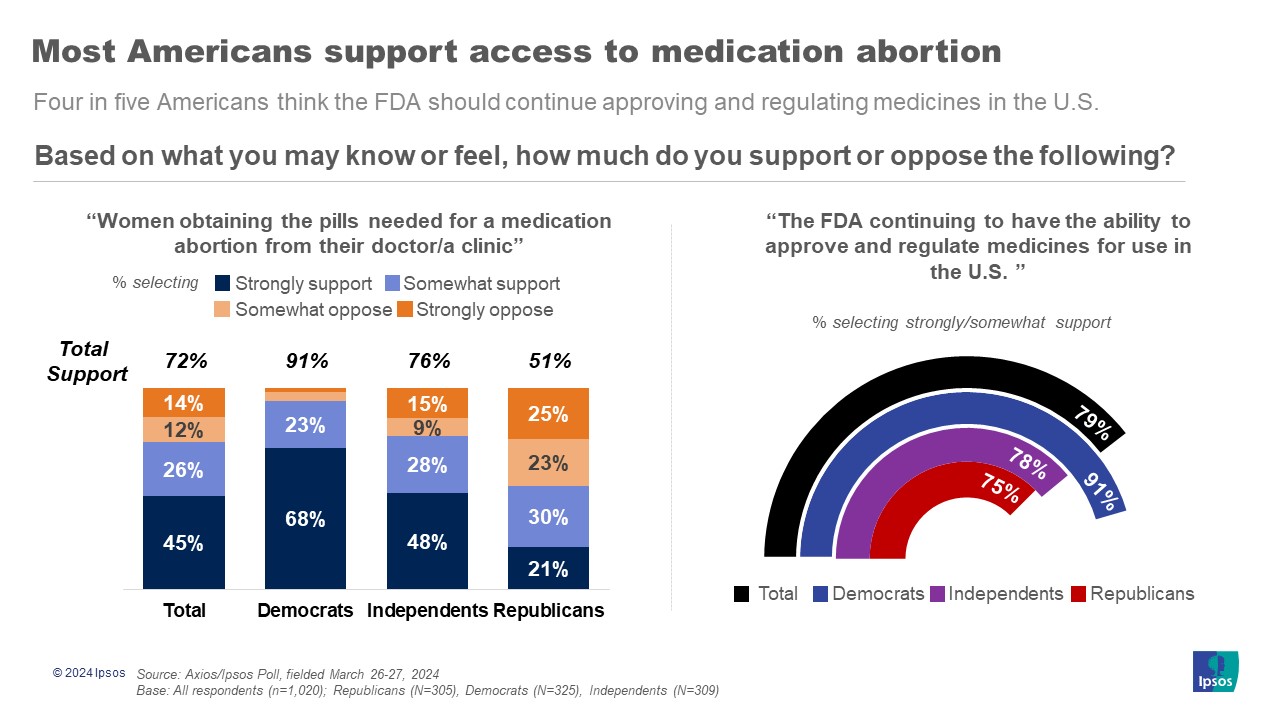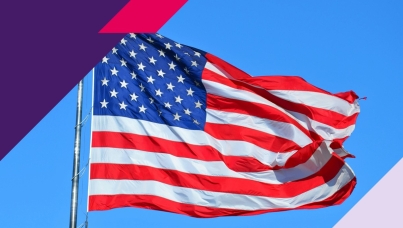Most Americans support access to medication abortion
Washington, DC, March 29, 2024 – Following the Supreme Court hearing oral arguments over access to mifepristone, one of the medications commonly used for abortion care, the latest Axios/Ipsos poll finds that most Americans, regardless of party affiliation, support women obtaining abortion medication from their doctor or a clinic. In fact, most Americans across party lines agree that abortion issues should be managed between a woman and her doctor, not the government. Given that the upcoming Supreme Court case around medication abortion may affect the way the Food and Drug Administration (FDA) approves and regulates drugs nationwide, it is important to consider that the overwhelming majority of Americans support the FDA continuing to take this regulatory role in the United States.

For more information about this study, please click here.
Detailed Findings
1. While fewer than half of Americans are familiar with the current status of the Supreme Court case surrounding mifepristone and the FDA, the majority of Americans, regardless of party affiliation, support women obtaining medication abortion pills from their doctor or a clinic. However, Americans are more divided on receiving abortion pills through the mail.
- Forty-four percent of Americans say they are familiar with the Supreme Court planning to hear oral arguments around restricting access to medication abortion. Further, only 15% say they are very familiar with it.
- Seven in ten (72%) Americans say they support women obtaining medication abortion from their doctor or a clinic, and 45% say they strongly support it. Meanwhile, just half of Americans say they support obtaining medication abortion through the mail.
- Regardless of party affiliation, the majority of Americans say they support obtaining abortion pills from an in-person doctor; however, party-line opinions diverge when it comes to obtaining abortion medication through the mail. Most Democrats (72%) and independents (54%) support women receiving abortion pills through the mail, but 77% of Republicans oppose them doing so.
- Americans are divided about whether they support a woman being allowed to obtain abortion pills from an in-person doctor without being allowed to do so through mail or telemedicine (48% support, 50% oppose). Republicans are more likely to say they support this in-person-only policy than independents or Democrats (58% vs. 49% and 41%, respectively).
2. When it comes down to it, the vast majority of Americans agree that abortion issues should be managed between a woman and her doctor, not the government. And, looking ahead to the general election in November, most Americans, including a majority of Democrats and independents, agree they would be less likely to vote for a candidate that supports restricting access to abortion.
- Four in five (81%) agree abortion issues should be managed between a woman and her doctor, not the government. This sentiment exists across party lines, but Republicans are slightly less likely to agree than independents or Democrats (65% vs. 82% and 97%, respectively).
- Fifty-eight percent say they are less likely to vote for a candidate that supports restricting access to abortion. While only a quarter of Republicans agree, most Democrats (86%) and independents (61%) say that a candidate who supports restricting abortion access would impact their vote. Seven in ten (69%) Democrats and two in five (43%) independents say they strongly
- As a whole, the majority of both men and women say they would be less likely to vote for a candidate in favor of abortion restrictions and that abortion should be an issue between a woman and her doctor, not the government. But the intensity of women’s perspectives on these issues are stronger: Women are more likely than men to say they strongly agree that supporting abortion restrictions would affect their vote and that abortion issues should be between a woman and her doctor, not the government.
3. Beyond only considerations of access to medication abortion in the U.S., most Americans ultimately say they support the FDA continuing to approve and regulate medications in the United States. Additionally, more Americans say they trust the FDA than the Supreme Court when it comes to information about health topics.
- About four in five (79%) Americans say they support the FDA continuing to have the ability to approve and regulate medicines for use in the U.S., with 38% saying they strongly support it. This majority sentiment is consistent across party lines, including 91% of Democrats, 78% of independents, and 75% of Republicans.
- Additionally, Americans who have attended at least some college, as well as those with a household income of $50k+, are more likely than their counterparts to support the FDA continuing to regulate and approve medications.
- Two-thirds of Americans (66%) say they trust the FDA a great deal or a fair amount when it comes to information about health topics. This majority sentiment exists across party lines, including 55% of Republicans, 61% of independents, and 87% of Democrats.
- Compared to trust in the FDA, significantly fewer Americans (39%) say they trust the Supreme Court when it comes to information about health topics. While Republicans are more likely to say they trust the Supreme Court in this circumstance than independents or Democrats, their trust in the Supreme Court around health information is generally muted. More Republicans say they trust the Supreme Court a fair amount (47%) than a great deal (10%).
About the Study
This Axios-Ipsos survey was conducted March 26 to March 27, 2024, by Ipsos using our KnowledgePanel®. This poll is based on a nationally representative probability sample of 1,020 adults ages 18+. No respondents were removed from the final data for refusing all of the survey items.
The survey was conducted using KnowledgePanel, the largest and most well-established online probability-based panel that is representative of the adult US population. Our recruitment process employs a scientifically developed addressed-based sampling methodology using the latest Delivery Sequence File of the USPS – a database with full coverage of all delivery points in the US. Households invited to join the panel are randomly selected from all available households in the U.S. Persons in the sampled households are invited to join and participate in the panel. Those selected who do not already have internet access are provided a tablet and internet connection at no cost to the panel member. Those who join the panel and who are selected to participate in a survey are sent a unique password-protected log-in used to complete surveys online. As a result of our recruitment and sampling methodologies, samples from KnowledgePanel cover all households regardless of their phone or internet status and findings can be reported with a margin of sampling error and projected to the general population. KnowledgePanel members receive a per survey incentive, usually the equivalent of $1 (though for some it is $2) in points, that can be redeemed for cash or prizes. No prenotification email for this study was sent prior to field. Panelists receive a unique login to the survey and are only able to complete it one time. No reminder emails were sent for this study.
The margin of sampling error is plus or minus 3.5 percentage points at the 95% confidence level, for results based on the entire sample of adults. The margin of sampling error takes into account the design effect, which was 1.27. The margin of sampling error is higher and varies for results based on sub-samples. Sampling error is only one potential source of error. There may be other unmeasured non-sampling error in this or any poll. In our reporting of the findings, percentage points are rounded off to the nearest whole number. As a result, percentages in a given table column may total slightly higher or lower than 100%. In questions that permit multiple responses, columns may total substantially more than 100%, depending on the number of different responses offered by each respondent.
The study was conducted in English. The data were weighted to adjust for gender by age, race/ethnicity, education, Census region, metropolitan status, household income and party id. The demographic benchmarks came from 2023 Current Population Survey (CPS) from the US Census Bureau. Party ID benchmarks are from recent multi-night ABC News polls. The weighting categories were as follows:
- Gender (Male, Female) by Age (18–29, 30–44, 45–59, and 60+)
- Race/Hispanic Ethnicity (White Non-Hispanic, Black Non-Hispanic, Other or 2+ Races Non-Hispanic, Hispanic)
- Education (High School graduate or less, Some College, Bachelors and beyond)
- Census Region (Northeast, Midwest, South, West)
- Metropolitan status (Metro, non-Metro)
- Household Income (Under $25,000, $25,000-$49,999, $50,000-$74,999, $75,000-$99,999, $100,000-$149,999, $150,000+)
- Party ID (Democrat, Republican, Independent, Other/None)
For more information on this news release, please contact:
Chris Jackson
Senior Vice President, US
Public Affairs
+1 202 420-2025
[email protected]
Mallory Newall
Vice President, US
Public Affairs
+1 202 374-2613
[email protected]
About Ipsos
Ipsos is one of the largest market research and polling companies globally, operating in 90 markets and employing over 18,000 people.
Our passionately curious research professionals, analysts and scientists have built unique multi-specialist capabilities that provide true understanding and powerful insights into the actions, opinions and motivations of citizens, consumers, patients, customers or employees. Our 75 solutions are based on primary data from our surveys, social media monitoring, and qualitative or observational techniques.
Our tagline "Game Changers" sums up our ambition to help our 5,000 customers move confidently through a rapidly changing world.
Founded in France in 1975, Ipsos has been listed on the Euronext Paris since July 1, 1999. The company is part of the SBF 120 and Mid-60 indices and is eligible for the Deferred Settlement Service (SRD).ISIN code FR0000073298, Reuters ISOS.PA, Bloomberg IPS:FP www.ipsos.com



